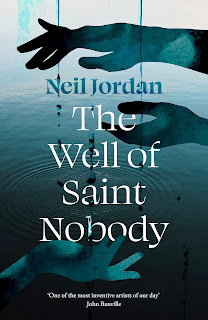The Well of Saint Nobody - Neil Jordan
William Burrows has a love/hate relationship with music. A once famous pianist who was celebrated in his day, William is now unable to play the piano, suffering from psoriatic arthritis, the skin peeling from his once nimble fingers. He comes to a small village in Cork, where he soon finds the need to engage a housekeeper for all the work that would find it difficult to do for himself in his current condition. Tara answers his ad in the local shop, Burrows not realising that the woman he has engaged knows him from several meetings in the past when she was a young aspiring musician. When he almost falls through a hole in the ground and discovers an ancient well, Tara invents a legend surrounding it having healing powers.
You might wonder why she would do that, but it's not hard to see the well becomes a metaphor for Tara's life, or more specifically her relationship with William. She wants to know if she has significance, if he can remember the few brief occasions when they met. The myth of the well's healing powers is about wiping the past clean, healing, but to do so also suggests bringing about closure and ending something. And in some ways Jordan's book and his writing in general plays its own part in that, in creating stories that have a tantalising hint of deeper meaning, but there is also some ambiguity involved in this. The reason stories and legends are created can be to cover up failings and hide the truth. When the myth becomes reality however, it may be that too much reality can mean death.
Not necessarily death in the literal sense but certainly in terms of closure, and that is very much what is important here. That idea definitely hits home - and hits hard - in the second part of the book. It does constitute a twist or a major development so I won't go into it here, but if the first half was almost wistful, albeit with an underlying current of deceit and self-deceit, the idea of loss and abandonment comes through from a new angle with the arrival of Alastair in part two. So no, it's not easy or right to pin down The Well of Saint Nobody to any one thing, but rather Jordan uses a variety of means to explore those sentiments, feelings and the actions they engender in all their complexity.
In the afterword, Jordan is open about the influences that inspired him to write the book, but they are by no means obvious and he definitely makes the story and its development very much his own. The writing is strong, occasionally beautiful, using musical references for expression of the underlying mood and temperament of the characters, with good choices of metaphors and - despite the importance of the well - without over-extending the symbolism. And when it comes to resolving those complex issues relating to the truth and reality, and how much to keep hidden and open, Jordan does that in a most satisfying way.
Reading notes: The Well of Saint Nobody by Neil Jordan is published by Head of Zeus/Apollo on the 3rd August 2023. I received an advance preview copy of the book in ePub/Kindle format from NetGalley.




Comments
Post a Comment